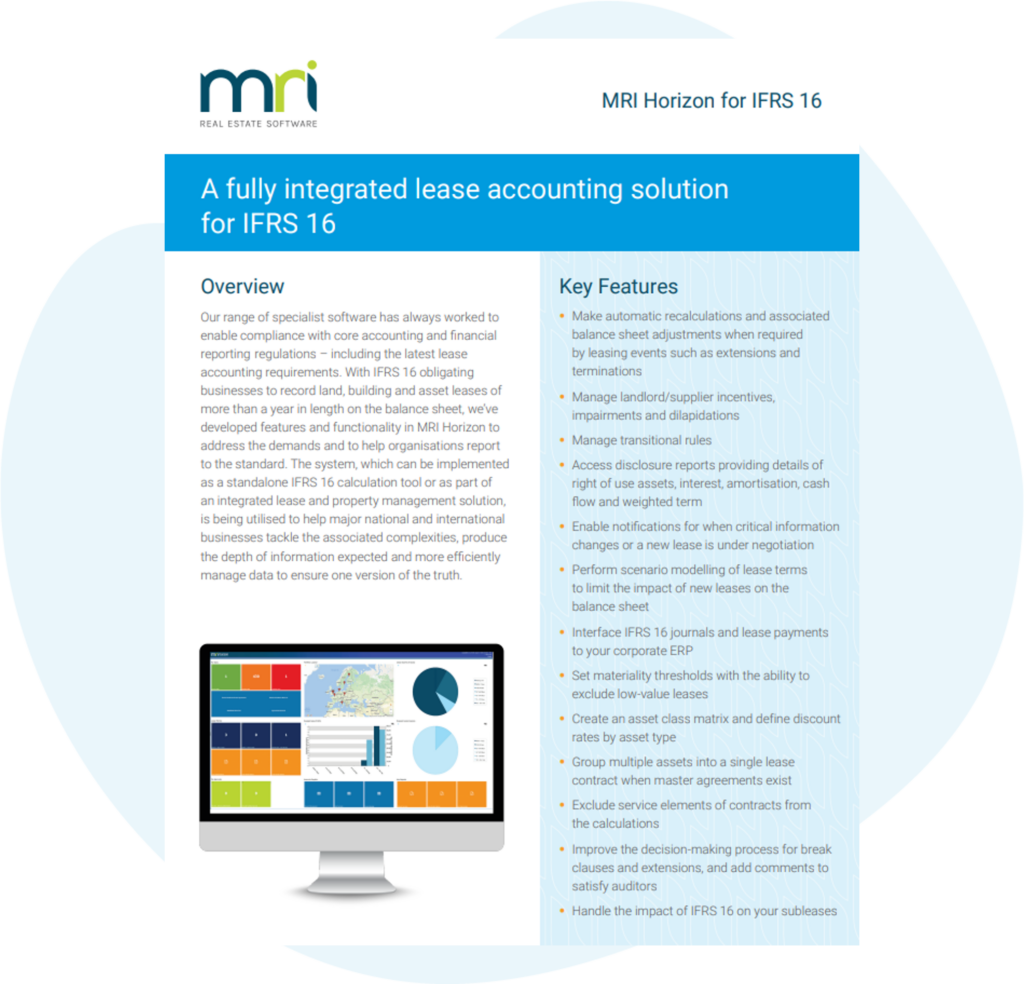A balancing act: how technology continues to help businesses keep IFRS 16 compliant
Lease accounting rules were dramatically altered when the International Financial Reporting Standard (IFRS 16), requiring all leases to be recorded on balance sheets in a bid to increase the transparency of business exposure to costs, came into force in January 2019. Yet, despite IFRS 16 coming into effect over two years ago, some businesses are still feeling the impact of the new legislation and struggling to make the right adjustments to their lease and accounting practices.
IFRS 16 represented one of the most significant changes to lease accounting in decades because it eliminates nearly all off-balance-sheet accounting for leases. Before IFRS16, businesses expensed leases, but now lessees must recognize assets and liabilities arising from leases on their balance sheets.
The business challenges of IFRS 16 compliance
Virtually every company has been impacted because most businesses lease several big-ticket items, including cars, offices, power plants, retail stores, cell towers and aircraft. COVID-19 has added complexity to leases with additional KPIs and clauses.
IFRS 16 spotlighted the importance of accurate, complete and incongruent data given the on-balance sheet accounting for almost all leases. Still, many organizations are struggling to achieve this because they are using old fashioned and manual ways of collecting the data, such as spreadsheets, which are inefficient, costly, and time-consuming.
The businesses most affected by IFRS 16 usually have a presence in multiple regions, different business operations, and often acquire companies. As a result, they have complex portfolio structures, and trying to manage all of that with spreadsheets and collect accurate data remains a considerable challenge. This has a knock-on effect on the ability of real estate teams to optimize portfolio performance and finance teams’ need for accurate IFRS 16 disclosures along with full amendment and validation logs.
Real estate and finance teams must work together
Furthermore, before IFRS 16, many organizations worked in siloed ways with real estate and finance teams having minimal interaction, but achieving regulatory compliance requires more inter-department collaboration and communication. IFRS 16 asks for an unprecedented degree of financial transparency. Businesses need to approach the entire process with a ‘one version of the truth’ mindset if company figures are to be 100% accurate. Consequently, accountancy needs to become an integral part of a real estate professional’s remit.
All real estate teams within an organization need to approach new and existing leases with the standard at the forefront of every decision. It may even be that traditional approaches to property are no longer within the business’s best interests. What’s more, accounting teams should now have a greater say in whether certain assets are bought or leased, completely reshaping the role of real estate. All of this means there’s a greater need for collaborative reporting.
How lease accounting software can help
Fortunately, technology is helping automate time-consuming and costly tasks and provides a central platform for collaborative reporting. Organizations that have overcome the challenges of IFRS 16 use technology that extracts the critical data – often using machine learning and AI for extensive lease portfolios – from leases in just a few minutes and eliminates manual errors so real estate and accounting teams can access accurate data in real-time.
Using the right software solutions ensures that half-year and end-of-year audits don’t become unmanageable, expensive tasks because there are full audit trails for any changes made during the lease lifecycle. Additionally, lease accounting software can ensure compliance by automating otherwise time-consuming calculations, prone to error and difficult to audit in a spreadsheet or different software approach. This means all teams have one platform which produces accurate reporting, allowing real estate and accounting teams to focus their time and attention on tasks that deliver real business value.
With the right lease accounting technology platform, companies have the capability to handle the huge churn in data and automatically analyze the numerous variables that can affect leases to ensure that all information is accurate and up to date. The upshot is that, through the effective implementation of the standard, IFRS 16 can help make the business not just more transparent, but more efficient.
Learn more about our Lease Management, Lease Accounting and AI-powered lease abstraction tools in the solution brochure.
Software solutions and services for workplace management, lease administration and lease accounting.Workplace

A fully integrated lease accounting solution
for IFRS 16
In today’s dynamic financial landscape, achieving compliance with evolving accounting and reporting regulations is more critical than ever. MRI stands at the forefront of facilitating this compliance, particularly in light of the demands set fo…
